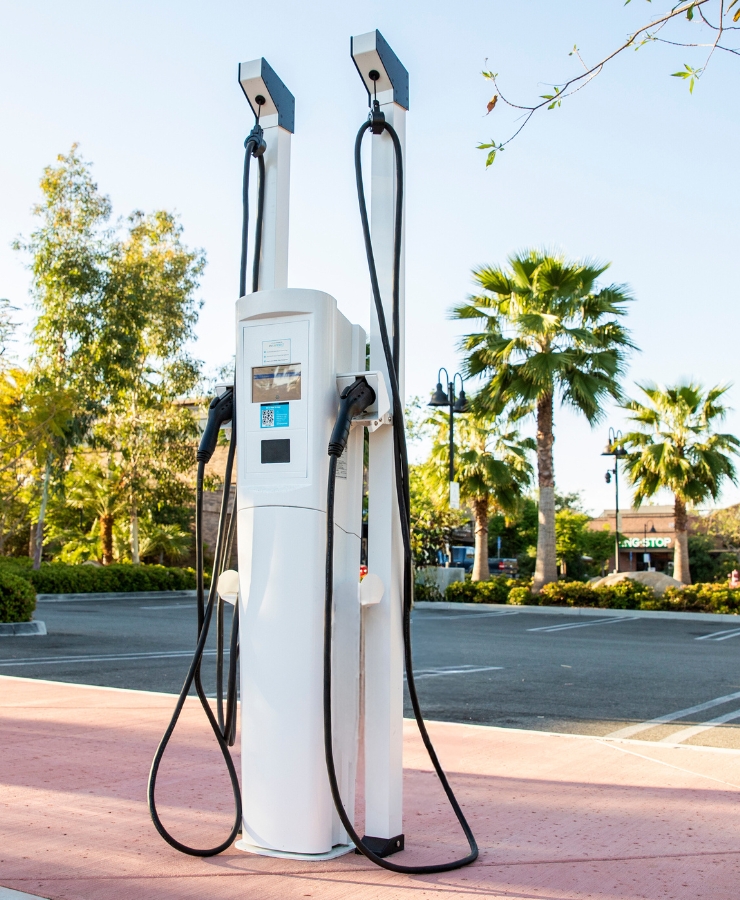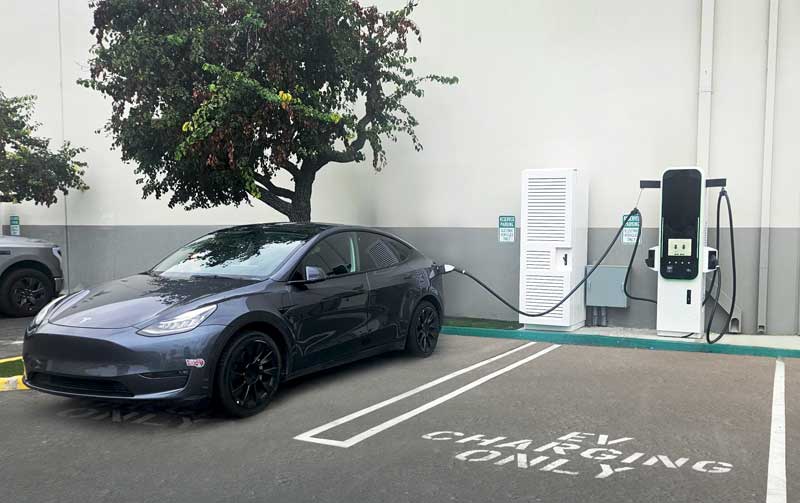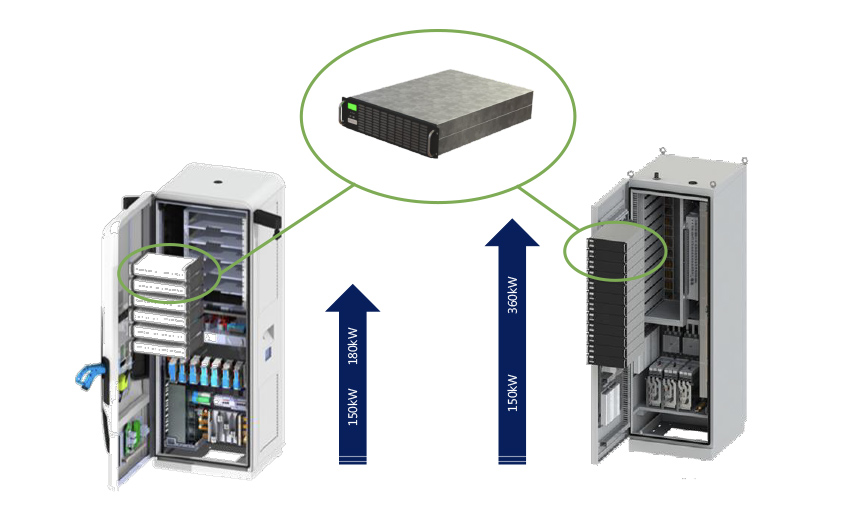On-Site EV Charging for Car Dealerships
As unit sales of electric vehicles continue to grow, auto dealerships face both challenges and opportunities related to this market shift away from internal combustion engine (ICE) vehicles. One critical aspect of this transition is the installation of commercial EV chargers at the dealership. Dealerships planning to invest in on-site EV charging infrastructure must consider the different types of charging installations to serve their circumstances best, depending on the type of EVs and audiences that require charging. However, the first question to answer is the “why” question – why install EV charging stations at your dealership?

Why install commercial EV chargers?
- Sales-ready operation – Installing commercial EV chargers at dealerships significantly improves the customer experience. Potential buyers can test-drive EVs without worrying about range anxiety, and sales staff can have vehicles test-drive ready.
- Customer satisfaction and loyalty – Existing customers can charge their vehicles while visiting for service or maintenance, or as needed. Dealerships will have repeated opportunities to maintain relationships with previous customers while ensuring that charging is available in their areas.
- Future-proof the business – As EV adoption continues to grow, having charging infrastructure in place positions dealerships for future success. The right charger with modular design can be upgraded as needed to charge future EVs that have more storage capacity.
- Generate additional revenue – While not the primary goal, dealerships can generate additional revenue by offering public charging services after hours. This can be especially beneficial in areas with limited public charging options.
- Attract new customers – EV chargers can serve as a magnet for potential new customers. EV owners may visit the dealership to use the chargers, providing opportunities for additional sales and service interactions. This increased foot traffic can lead to more test drives and, ultimately, more vehicle sales.
- Support service operations – For dealerships with service centers, on-site chargers are essential for maintaining and testing EVs. Technicians need to charge vehicles before and after service, and having readily available chargers streamlines these operations. And, there’s the goodwill of returning a call after service fully charged.
- Demonstrate commitment to electrification – By installing EV chargers, dealerships show their commitment to the electric future of transportation. This visible investment in EV infrastructure can help build trust with environmentally conscious consumers and position the business as forward-thinking and innovative.
- Educate customers – On-site chargers provide an excellent opportunity to educate customers about EV charging. Sales staff can demonstrate how to use different types of chargers, explain charging speeds and address common concerns about EV ownership. This hands-on experience can help alleviate potential buyers’ anxieties about transitioning to electric vehicles.
Choosing the right type of commercial EV charger
When considering which type of charger to install, dealerships should consider both Level 2 and Level 3 (DC fast charging) options. Each has its advantages and use cases.

Level 2 EV chargers
Level 2 EV chargers are an excellent choice for most EV charging for car dealership applications:
- Cost-effective: They are less expensive to install and operate than DC fast chargers.
- Overnight charging: They can fully charge most EVs in 4-8 hours, suitable for overnight charging or during longer service visits.
- Universal compatibility: Currently, Level 2 chargers are considered universal across all models.
- Lower power requirements: They don’t require as much electrical infrastructure as DC fast chargers.

Level 3 EV chargers (DC fast charging)
While more expensive, DC fast chargers offer several benefits:
- Rapid charging: They can charge most EVs to 80% in 30-60 minutes, which is ideal for quick top-ups during test drives or short service visits.
- Attract more customers: The speed and convenience of fast charging can draw more EV owners to the dealership.
- Showcase cutting-edge technology: DC fast chargers demonstrate a dealership’s commitment to the latest EV technology.
- Support high-end EVs: Many luxury and performance EVs benefit from faster charging capabilities.
- Revenue capabilities: This style charger is easy to outfit with a touchscreen for brand messaging and payment options for after-hours revenue generation.
For most dealerships, a combination of commercial Level 2 and Level 3 EV chargers would best serve their requirements. Level 2 chargers within the service garage, for example, can charge vehicles left for servicing. Depending on the dealership size, a few external DC fast chargers can supply rapid charging for test drives, quick service visits or to service customers after hours.
Read more about EV chargers for dealerships in our blog, Commercial EV Chargers At Car Dealerships: Powering The Future Of Automotive Retail.
Why choose BTC POWER for commercial EV chargers
BTC POWER understands the needs of domestic auto dealerships and is a leader among North American EV charger manufacturers. Founded in 1999 and headquartered in the US, BTC has sold more than 22,000 commercial EV charging stations worldwide within a product range from 7.2 kW to 350 kW. Our experience is incorporated into our EV charging station design to address the most pressing challenges of crafting EV charging infrastructure. As a result, BTC POWER has the industry’s highest uptime among commercial EV charger manufacturers at 98%.
Interested in learning about funding for EV chargers? Visit our NEVI funding page to learn more about funding and NEVI-compliant EV chargers.

Frequently Asked Questions
EV charging at car dealerships often has different pricing structures depending on the audience or person that requires a charge. The dealership might allow customers to charge for free, while the general public might pay a fee that depends on local electricity rates, charging speed, and the dealer’s pricing strategy.
EV charging typically costs less than gasoline fueling. This makes EV charging for auto dealerships an attractive service for these businesses to offer their customers while potentially boosting dealership traffic.
EV charging stations can be profitable for car dealerships, particularly as part of a broader strategy to attract EV owners and establish new revenue streams.
EV charging for auto dealerships can supply revenue opportunities in multiple ways:
- Charging fees at external charging stations available to the public
- Attracting new customers interested in purchasing an EV
- Increasing service department visits
- Offering advertising opportunities on the display panel
- Offering other amenities while customers charge their vehicles
